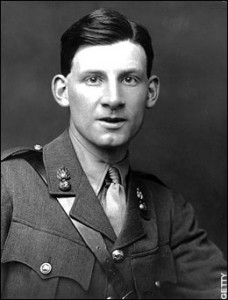 Synonymous with the Great War, poet Siegfried Sassoon was born in 1886 in Kent, England, and went on to epitomize the essence of the anti-war poet. Sassoon came from a well-to-do family, a father who came from a Jewish merchant family and a mother who was Catholic and part of an artistic family, the Thorneycrofts. Theirs was not a happy relationship, they separated when Sassoon was only four years old, and when the father came to visit, his mother would lock herself away in her room. Tragedy struck a short while later when Alfred Sassoon died of tuberculosis. Siegfried was nine years old.
Synonymous with the Great War, poet Siegfried Sassoon was born in 1886 in Kent, England, and went on to epitomize the essence of the anti-war poet. Sassoon came from a well-to-do family, a father who came from a Jewish merchant family and a mother who was Catholic and part of an artistic family, the Thorneycrofts. Theirs was not a happy relationship, they separated when Sassoon was only four years old, and when the father came to visit, his mother would lock herself away in her room. Tragedy struck a short while later when Alfred Sassoon died of tuberculosis. Siegfried was nine years old.
Sassoon was educated at several schools until he went to Cambridge in 1905 to read history. He didn’t finish his studies and spent the next couple of years either hunting, playing cricket or writing verse, some of which he published privately. Indeed, before he ever went to war Sassoon professed that playing cricket was probably the most important thing in the world.
As war was declared in 1914, Sassoon did his patriotic duty and joined the army, but he broke his arm whilst riding and convalesced until he was commissioned to the Royal Welsh Fusiliers as a second lieutenant. While his brother was killed at Gallipoli, Sassoon was gaining a reputation for bravery, being nicknamed ‘Mad Jack’ for his exploits on the front in France.
Sassoon returned to England in 1916, recovering from a bout of fever. He went back to the front shortly after but was then wounded. While he was convalescing, his disillusionment with the war began to grow, a view strengthened when he met prominent pacifists such as Bertram Russell. He wrote a letter that complained the British government was trying to prolong the war and would have been court marshalled and sent to prison had not poet Robert Graves stepped in to say that Sassoon was suffering from shell shock.
At Craiglockhart War Hospital, Sassoon met Wilfred Owen who was to become another of the Great War poets. While Owen went back to the front and was killed in 1918, Sassoon was posted first to Palestine and then returned to France where he was once again wounded, this time by friendly fire and returned to his home shores.
Perhaps one of the reasons why Sassoon has endured as one of our outstanding war poets is that he never shirked the responsibility that came with his standing and class. He was willing to put his head above the parapet in more sense than one. He left the army with the rank of Captain, decorated for bravery, but had during that time also stood up to the government who sent men to the front. He wrote eloquently and honestly about the business of a soldier in the Great War and spent many years reflecting on it in his memoirs over the years following.
While nothing would compare to his war experiences, Sassoon continued to live a full and productive life. He became editor of the Literary Herald and toured America giving lectures and wrote a wide range of novels and poetry. In 1967 he succumbed to stomach cancer and passed away a week shy of his 81st birthday.

